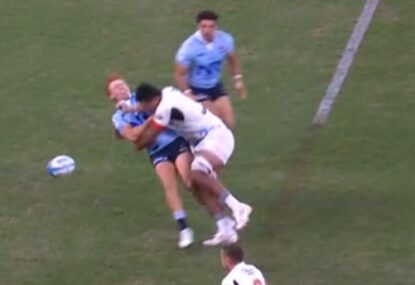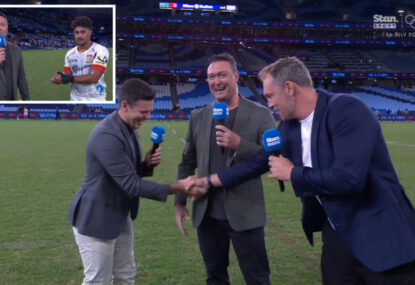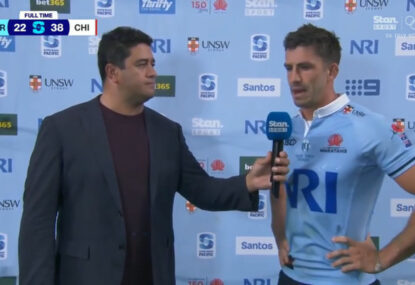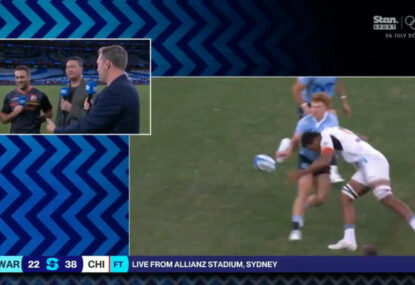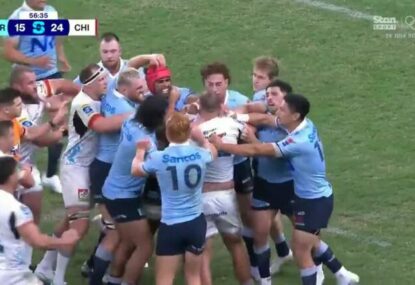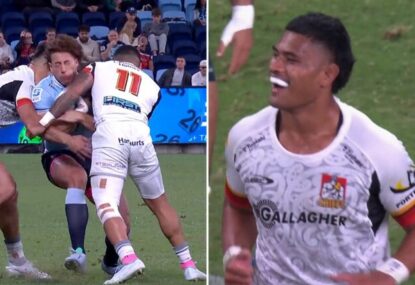For quality, the Super Rugby competition regularly produces the best moments, but occasionally a Northern Hemisphere story outweighs all others for significance – and this is one of those weeks.
Some will tell you the Six Nations isn’t the competition it once was, which may or may not be true, and perhaps it’s a competition that won’t be fully revitalised until they admit fresh blood in the form of Romania and Georgia, but a Grand Slam by England is nothing to be sneezed at.
They went to Paris with a different attitude than in previous years, when they might have kicked into corners and tried to strangle the French with low-risk rugby. With their questionable recent record in implementing such tactics, the new England weren’t looking to bore the crowd.
Honours for man of the match would be split between number eight Billy Vunipola and halfback Danny Care, both responsible for game-breaking moments. Their combination at the base of the scrum produced the match-winning try for wing Anthony Watson.
But the real story is the coaching of Eddie Jones. To begin such a huge career move with five successive wins is something only a handful of All Black and Springbok coaches have achieved.
Since taking the helm at England, Jones has changed the way England approach the breakdown. For years, southern critics have been telling Englishmen that staying on their feet at the breakdown is the key to succeeding in the modern game. Eddie has made continuity their number one priority.
Mark my words, between now and the next World Cup he will build them into a very formidable outfit, probably dropping only the occasional result to southern tourists, and he will take England into Japan 2019 as one of the favourites.
They may revert to type occasionally, like when they face an All Blacks side and know in advance that their continuity credentials are outmanned. But even the All Blacks use a conservative game plan on occasion.
The big news is English rugby has made a directional change, symptomatic of how the world’s most dynamic sport is constantly improving itself. England was only ever briefly the best at playing a conservative game. Their success rate did not justify sticking with it.
Eddie Jones will also take English rugby back to a pinnacle it hasn’t reached in generations. A long winning streak will put it back at the apex of British sport. This is because corruption and a woeful international losing streak will make sure soccer’s grim slide from popularity keeps accelerating.
In the Southern Hemisphere, where, unlike the north, people get cooler the further from the equator you go, the Super Rugby competition hit top gear at last.
The Hurricanes blew the Force off the park in Palmerston North, hitting 41-6 in a scintillating display. Dane Coles returned to the front row and the captaincy, celebrating with a neat try from a lineout move. Number eight Victor Vito took his throw cleanly, handing it down to flanker Ardie Savea to work the trick with Coles around the front.
Great handling by forwards and backs made the next try for fullback James Marshall. A short ball from halfback TJ Perenara created the final hole. Perenara finished off another when big three-quarter Willis Halaholo broke clear.
More sweeping rugby saw blindside Blade Thomson cross for the fourth, powerhouse midfielder Ngani Laumape dived over in the corner for a fifth, and openside Ardie Savea capped yet another exciting performance with a sixth from a lineout drive.
Their freedom of expression is re-emerging after a tough few opening weeks.
Later that Friday, the defending champion Highlanders went to Sydney with their fifteen-man game already in good nick, and fought out a classic game of two halves. They held off a late surge from the Waratahs to win 30-26, after it had looked completely one-sided at 30-0.
The four Highlanders tries all seemed to catch the home side napping. A Rod Thompson midfield break-and-offload sent winger Ryan Tongia into the clear for the opener. A Waratahs fumble snapped up by hooker Liam Coltman saw the New South Welshmen make their transition to defence way too slowly, and number eight Liam Squire skipped out of some embarrassingly bad tackles in a forty yard run to the line for the second.
Then two kicks out wide were retrieved and converted into points by Elliot Dixon. The first was a bobbling ball, bouncing up nicely for him, but the next he had to pluck from the grasp of a wide defender before running it in. Those two tries, popping up where blindside flankers don’t as a rule, and his fine work stealing Waratahs lineout ball made him man of the match.
The long range nature of their tries made the 30-0 scoreline a slightly inaccurate reflection of the territory and possession statistics, but the 26-point comeback also ended up flattering the Waratahs. Two of their four tries were given with a suspicious lack of evidence, one a blatant offside which the referee didn’t even question.
If anyone thinks a try here and there doesn’t matter if the right result has been achieved, think again. The momentum gained from even one dodgy decision can totally alter proceedings, and this was a try-scoring bonus point the Highlanders may well regret the loss of.
There wasn’t much to report from Christchurch, where the Crusaders beat the Kings 57-24, apart from the fact the 24 points they let in were conceded unnecessarily. Dominance in the ball-in-hand phases should be backed up with ruthless defence, and there were a few too many tackles missed and opportunities given away. A few new faces were given a starting role, however, so their elevation was probably timely.
In Brisbane, that pestilential hellhole where you need three showers a day just to wash off the mist from everyone else’s 60+ aerosol sunscreen, the Blues came away from Suncorp Stadium with a 25-25 draw.
The foreign language of the commentators made it hard to understand proceedings – I have no idea what the Blues and Reds “both having difficult starts to the Susan” even means – but it was clear that the two sides were equally desperate.
It was also clear that defence has been an Achilles heel for both teams so far in 2016, especially when a simple one-two between Blues livewire backs Ihaia West and Rieko Ioane put West in, then Reds midfielder Chris Feauai-Sautia wrong-footed flanker Steven Luatua a little too easily.
Blues fullback Lolagi Visinia broke clear from deep in his own half and the Reds cover couldn’t converge quickly enough to stop halfback Bryn Hall finishing seventy yards later. The Blues tackling was just as weak when Reds centre Samu Kerevi broke through. The match looked lost for the visitors when the home side turned them completely inside out and first five Jake McIntyre dived over in the corner.
Thank God the scoreboard was accurate, because trying to decipher the commentary was impossible. It was clear they were delighted – and when I say they sounded as happy as pigs in mud, I mean there were actually lots of snorting – the Blues at this late stage trailed by ten points.
With six minutes remaining, however, Tana Umaga’s young charges worked their way into scoring position and replacement halfback Billy Guyton dived over beside the posts, it was only scene one of a dramatic final act.
Three minutes later, when referee Andrew Leese yellow-carded Sione Mafileo, apparently for the unforgivable act of pushing in a scrum, all looked lost for the visitors. Somehow they worked their way downfield again and arrayed themselves in aggressive posture with the Queensland defence spread-eagled.
Miraculously, they appeared to have landed the knockout blow when West put men through a yawning gap, but the pass was called forward. The gap, in fact, was so huge that West’s pass didn’t even need to be forward, let alone by the ridiculous margin it was. It didn’t matter. Lees was standing back on the 22, whistling for no advantage, Blues penalty.
The only sensible thing was to kick three points for the draw, and that message from Umaga was communicated to them via the waterboy. Lucky it was too, because the Blues looked like they were about to kick for the corner and attempt a lineout drive, after having failed three times last week to do the same thing against the Hurricanes.
Back then they were a man up at Eden Park, as opposed to a man down at one of the world’s most famous venues for bad tastes in visitors’ mouths.
Reason prevailed.
It wasn’t the only draw of the round. The Bulls held the Sharks to 16-16 in Pretoria, but only because the usually unerring Joe Pietersen bombed a sitter. The Rebels whipped the Sunwolves 35-9 in Tokyo, Johan Ackermann’s Lions overpowered the Cheetahs 39-22 in Johannesburg and the Stormers outclassed the Brumbies 31-11 in Cape Town.
The real drama was yet to come, however. The Jaguares were about to make their Super Rugby home debut in Buenos Aires, and the game produced the two best tries of the season so far, both coming in the final five minutes.
The first seventy-five minutes were riveting enough. Some of the competition’s most inventive handlers were distributed between the two sides and they all looked hell-bent on making the highlights reel.
Tries to Jaguares hooker Agustin Creevy and halfback Martin Landajo were routine finishes close to the line, but if some of the home side’s more adventurous passes had stuck they could have been safely out of range by half-time.
The Chiefs had matched them, however, with tries in each corner. Right wing Sam McNicholl got one and fullback Damian McKenzie the other, slick handling featuring in both lead-ups.
Then Tawera Kerr-Barlow was yellow-carded (fairly) by New Zealand referee Chris Pollock. He’d played the ball without regaining his feet. Brad Weber had to replace him at halfback, in what became a vital tactical substitution.
No crisis was apparent when McNicholl and midfielder Charlie Ngatai combined to send centre Anton Lienert-Brown into space down the left, and he ran wing James Lowe in with a clinical draw-and-pass.
But with time almost up the Jaguares hit the lead again with a sensational display of passing between backs and forwards from long range, and replacement speedster Matias Moroni handed off McKenzie to score.
Twenty-five thousand Argentine fans went berserk, rightfully so because it was a sensational piece of testosterone-fuelled rugby featuring hook passes, offloads and scissor moves which Englishmen can only dream of.
Only great teams respond to such heavy blows in high-pressure environments like these, and the Chiefs came up with something even more magical of their own.
Just before being tackled on halfway, McKenzie slipped a ball to Lienert-Brown on a narrow blind. Lienert-Brown found his replacement midfield partner Seta Tamanivalu with an offload between the two men double-teaming him.
Hairy Argentines were coming from everywhere, frantic to shut down the movement and hold onto their lead. Tamanivalu’s fingertips somehow fastened themselves to the low ball, and the big Islander sucked another two tacklers in before netballing it to Lowe. Jaguares were still converging though, and Lowe was brought down in what looked to be the match-winning tackle.
Co-captain Aaron Cruden seemingly materialised out of nowhere. The deafening roar being raised was so shrill that there was no way Lowe could have heard his first five call the angle switch, so when he loosed the fourth of the Chiefs’ five outrageous passes there simply must have been a measure of blind faith.
It fell into Cruden’s hands as he crossed behind Lowe, and the little wizard lured the final exhausted defenders wide before hitting Weber with a pinpoint skip pass back infield.
Quality like this, especially to finish such a classic encounter, almost always has an element of chance. There is an infinite number of ways that such a move could break down.
Only a great team could have pulled it off, and freakishly exciting tries in the final seconds on the road are something that the Chiefs might well claim to do better than anyone else.
So the Jaguares have nothing to be ashamed of. Forty-nine times out of fifty, they would have won this fixture.
Welcome to Super Rugby. Margins are razor thin.































































































